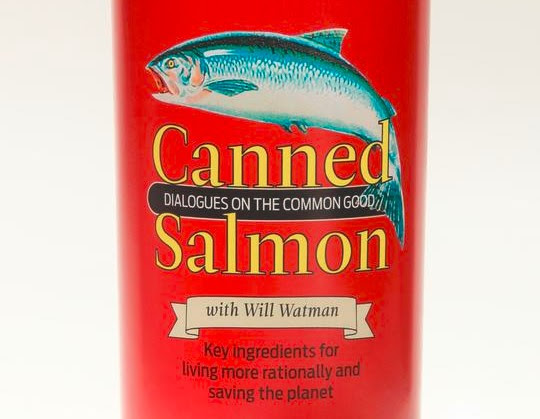If its name sounds unconventional and a bit intriguing, readers of “Canned Salmon: Dialogues on the Common Goodwill” no doubt confirm those labels when they open this newly released e-book. Part social science textbook, part historical tract and part instructive handbook, “Canned Salmon” serves as a sort of contemporary manual for the alternative choices Americans who are young, old and in-between can make to live more fulfilling lives now and in the decades to come.
Filled with tips on how to live more self-reliantly, in better health and with a minimum of cash, the book is a fascinating, timely, and wholly useful exploration of how to cope in a rapidly changing and challenging social, political and economic universe.
Canned Salmon came about when its author, Becker Smith, decided to compile a book-length compendium of his many fascinating conversations with educator, philosopher and visionary thinker Will Watman.
Watman, of Portland, Maine, has long been an alternative thinker, with a lot to say about many of the challenges and opportunities for living more sanely and meaningfully in an increasingly complex and confounding world.
In this piece below, Watman explains the reasons behind “Canned Salmon.”
The term “inflection point” is being used often in the dynamic world of rapid business change. For example, “land line use has reached an inflection point” as we transition to cell phones. Observers of the stock market cite the phrase often in their attempts to predict direction.
I believe we are at many inflection points in the social order, and these points indicate enormous opportunity. When the world is merrily churning along and the social order is fairly well established, and people are more or less content (or the majority is), there is little opportunity for the next gen to distinguish itself, or any meaningful new “think.”
When I was leading a design studio at George Mason University, I would ask the members of every in-coming class if they would be content inheriting their guardians’ way of life, if more of the same appeared to be a path that worked for them. Those that agreed, I politely asked to drop the course. The rest began a process of speculation of what alternatives to current systems might look like, live like, and how we could achieve them.
In a world where it appears that the basics of shelter, warmth, nutrition, and place stability can no longer be assured, clearly the alts have to be developed, and we’d better be quick about it.
Our process then and now, within the context of this exercise, is not to struggle to design the next new thing, or patent the next invention or app to solve a current problem. My premise is that surveys of best practices, wherever we find them, if assembled and integrated into our context, have the power to solve our problems.
To a great extent, we have to reclaim past practices that worked before and might again. Intergenerational living was a practice of civilization of the millennium. It is only in the past 200 years that we have atomized the family or community. Could we get there again? Can we secure our food sources? Can we adapt to climate change? The answers to these questions are not going to come from on high, or my lectern. The answers to these questions are going to come through a process wherein the participants can and will assume ownership of the ideas that are generated here.
“Canned Salmon” is being offered as an entirely free download for a limited period of time. If you have any questions for Watman after reading the book, feel free to write to us at info [at] shareable [dot] net, or reach out to us on Facebook or Twitter. We look forward to hearing from you.









